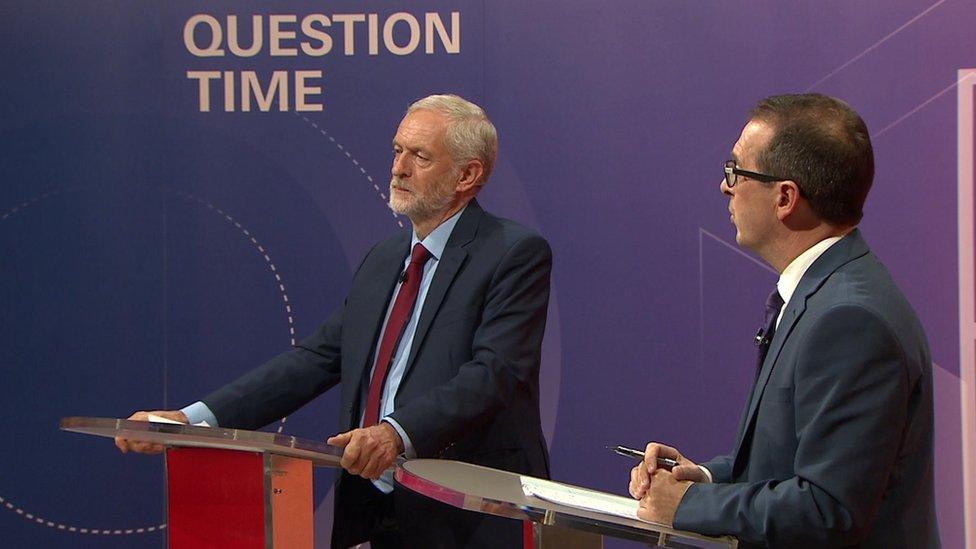Corbyn and Smith clash over Brexit, unity and anti-Semitism in BBC hustings
- Published
Jeremy Corbyn and Owen Smith respond to the suggestion that neither of them appear able to unite the Labour Party
Jeremy Corbyn and Owen Smith have clashed over party unity, Brexit and anti-Semitism in a live BBC debate.
The contenders fielded questions from a special BBC Question Time audience in Oldham, chaired by David Dimbleby.
Mr Corbyn insisted Labour would "come together" if he was re-elected leader but Mr Smith said the party would be in opposition "for a generation".
The head-to-head came just weeks before voting in the race closes, with the winner to be named on 24 September.
Mr Corbyn is being challenged for the leadership after many of his top team resigned and he lost a vote of confidence among Labour MPs.
He is still deemed to be the frontrunner among party members while his rival Mr Smith, a former shadow work and pensions spokesman, commands support among Labour MPs.
Responding to an audience member who suggested that the failure of the two candidates to unite the party meant Labour was "unelectable", Mr Corbyn said it would "come together" again after the contest if he were to win.
"You will see the wish of MPs to reflect the wishes of party members all over the country that there's a coming together in order to oppose this Tory government," he told the audience.
Mr Smith said he admired Mr Corbyn's "optimism" but added: "I don't think that's what we will see." He said Labour was going "backwards" under Mr Corbyn and at its "lowest ebb in the polls since 1982".
Setting out his stall, Mr Smith insisted he was the one to turn Labour in to a "credible opposition" that could "take on the Tories" - adding that he was "incredibly confident" he could win the leadership election.

On Brexit, Mr Corbyn - who campaigned for Remain but who has been accused by many Labour MPs of not making the case to stay in the EU forcefully enough - said he wanted to remain in the single market "if it's possible, and I think it probably is".
His comments come after his aides suggested on Wednesday that he might rule out full membership of the single market unless the UK could negotiate exemptions from key EU rules.
Meanwhile, Mr Smith restated his wish for a second EU referendum, and said he wanted Labour to promise at the 2020 general election to take Britain back into the EU.
Asked if that meant to ignore the Brexit vote, he replied: "Well, exactly."
'Anti-Semitic attitudes'
The two leadership contenders also clashed over the party's record on tackling anti-Semitism and abuse within Labour, with Mr Smith questioning whether Mr Corbyn was "entirely committed" to it.
He claimed there was a "hard left infiltration" of Labour and that some were "bringing in to our party anti-Semitic attitudes".
"Jeremy has not been strong enough in speaking out against it," he said, saying many in the Jewish community felt that the review of anti-Semitism in Labour, conducted by former Liberty director Shami Chakrabarti, had been inadequate.
He said he would launch a new review "to look at the problem that we've got in Labour, and to deal with it" with a "zero tolerance approach".
But Mr Corbyn hit back, criticising Mr Smith's attacks as "unfair". "I have spent my life opposing racism in any form," he added.
He defended the anti-Semitism review and said "obviously it should be subject to review at a later stage to see how it is getting on".
And he insisted Labour "is a safe place to be" for people of all faiths and religions.
The Question Time special is available on BBC iPlayer.